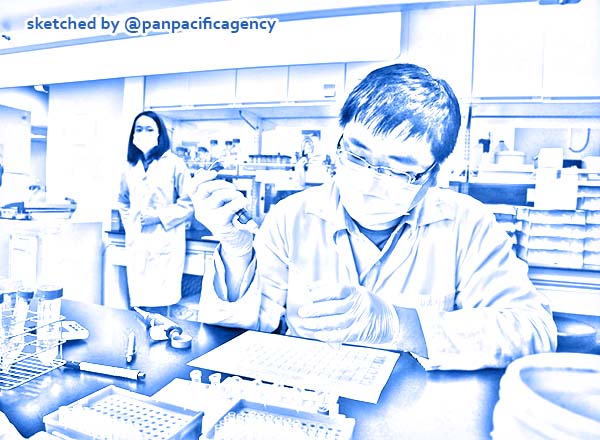Taiwan develops 10-minute coronavirus test kit with 100 per cent sensitivity and 95 specificity

A local Taiwanese biomedical company has developed a test kit for the coronavirus that can provide results in a mere 10 minutes. Photo: CNA. Sketched by the Pan Pacific Agency.
TAIPEI, May 8, 2020, Taiwan News. A local Taiwanese biomedical company has developed a test kit for the Wuhan coronavirus (COVID-19) that can provide results in a mere 10 minutes, Taiwan News reported.
At a press conference on Thursday (May 7), Cooky Chen (陳作範), chairman of Excelsior Bio-System, Inc. (EBS), announced that the company has created a rapid test kit to detect antibodies for SARS-CoV-2, the virus that causes COVID-19. Chen said a clinical study carried out by National Taiwan University Hospital (NTUH) has validated the test kit.
The kit’s rapid screening reagent can determine whether a person has been infected with the coronavirus within 10 minutes. Similar to a pregnancy test, if a person is positive, two lines will appear in the test window.
Chen claims that the test has 100 percent sensitivity and 95 specificity, reported BCC News. Hsieh Szu-min (謝思民), project manager and infectious disease specialist from NTUH, said that its high level of sensitivity was demonstrated by the fact that it detected antibodies in 13 coronavirus patients tested.
Chen stated that the test kit was submitted to the Health Ministry for urgent authorization for production on May 5, reported TVBS. Once approval is granted, Chen estimates the company can manufacture 300,000 to 400,000 tests per month and implement fully automated packaging by the second half of the year with the hope of serving both domestic and overseas needs.
The chairman said that in the past, the research and development of fast screening reagents generally took at least eight to ten months but that since mid-February, senior members of the research and development team have fully devoted themselves to the project, thus shortening the process.